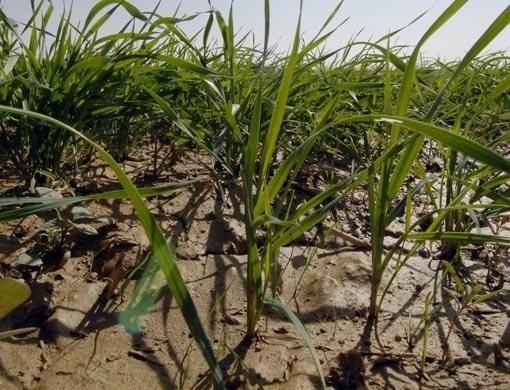Amman: A drought that has hit major Middle East wheat producers has lowered summer harvests, prompting bigger imports in once self-sufficient countries like Iran and Syria at a time of record grain prices.
From Iran to Iraq to Syria crops are lower, with the exception of Turkey, whose harvest is expected to pick up after last year's dry weather hit output.
"This whole Eastern Mediterranean all the way over to Iran had a drought and I think parts of Turkey, Syria into Iran at least the rain fed areas and this affected the crop," Dick Prior head of US Wheat Associates' Middle East and North Africa office said.
Whilst it is difficult to estimate the latest imports needs of the a Middle East region, once self sufficient countries like Iran and Syria have already begun to import, to compensate for the lower crops that start from May to early August.
"Import needs are a little bit more than they were in the past in the region because for example Iran is changing from a net exporter last year to a fairly large importer this year," Prior added.
Poor rainfall will slash this year's harvest in Syria, a major foods and commodities player in the Middle East, to around 2.3 million tonnes from 4.2 million tonnes last year, according to traders and agronomists.
Syrian officials who deny it will go that far concede it will drop to 3 million tonnes, eroding a strategic stockpile of at least 1.5 million tonnes in country with wheat consumption of at least 3 million needed to feed 19 million people.
Syria's private millers have begun importing Black Sea wheat and the country is studying issuing tenders to buy soft wheat and even contemplating importing US wheat as its production hits a nine-year low. Barley production is also expected to fall to almost a third of last year's 800,000 tonnes production.
In Iraq, agronomists say cold winter weather followed by drought is expected to cut the harvest to at best 400,000 tonnes of hard wheat from last year's 600,000. Barley production is not expected to reach more than 300,000 tonnes, grains experts say.
Drought conditions have transformed neighbouring Iran from a self sufficient country with a local crop as high as 15 million tonnes - that even saw exports to Iraq and elsewhere in 2007 - into a significant importer this year.
The country's harvest may be as low as 12 million tonnes this year - with a shortfall of anywhere between three to five million tonnes in local demand. Officials have said they may need to import up to 5 million tonnes by March 2009.
Iran, a country of 70 million people, has already entered the global market and bought Black Sea origin and North American wheat that experts say blends with its local grain.
Only two countries that depend on irrigation and underground water rather than rain, Egypt and Saudi Arabia, are shielded by the climatic conditions that have hit the East Mediterranean.
Egypt's local crop is expected to remain steady but in a major shift, Saudi Arabia is expected to start importing wheat this year as it abandons a 30-year scheme that achieved self sufficiency but depleted scarce water resources.
Only Turkey, whose harvest is picking up in southeastern Anatolia after a severe drought during the first half of 2007, imports forecast to be less than last year.
The harvest could reach 16.5 million tonnes - almost one million tonnes more than last year's 15.5 million tonnes. It is still lower than 2006 production of around 17.5 tonnes .
Although Turkey is close to self-sufficiency, some wheat imports of varying qualities could be needed to offset an equivalent amount of flour exports that are estimated at around one million tonnes, grains experts say.
The soaring cost of food imports with wheat at record high prices has also prompted Middle East importers to rely more on cheaper Black Sea origin than supplies from North America, where freight costs alone can add at least $60 per tonne.
"The Middle East is going to soak up the surplus Ukrainian and Russian wheat...they will be importing that steady through out six or seven months," one leading commodities expert said.
Only Iraq, where US firms have mainly for political reasons dominated the market since 2003, will remain dependant on more expensive North American and recently Australian wheat.












